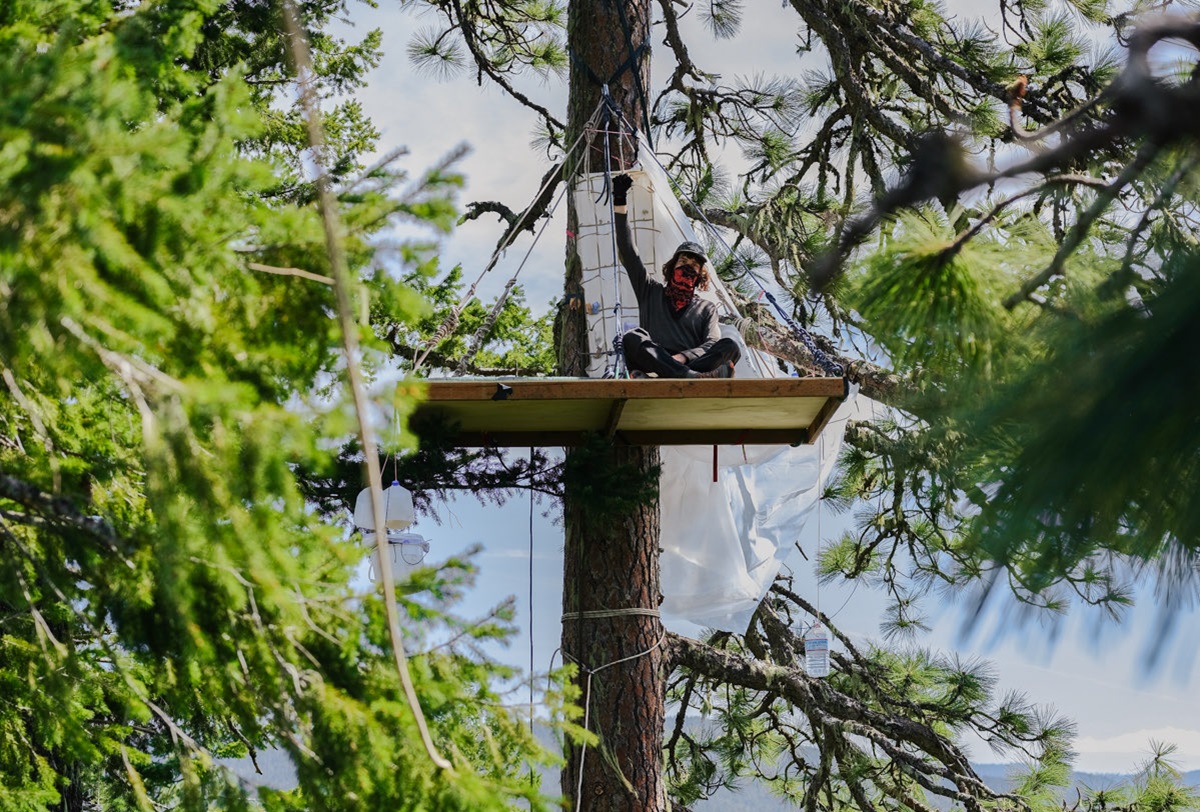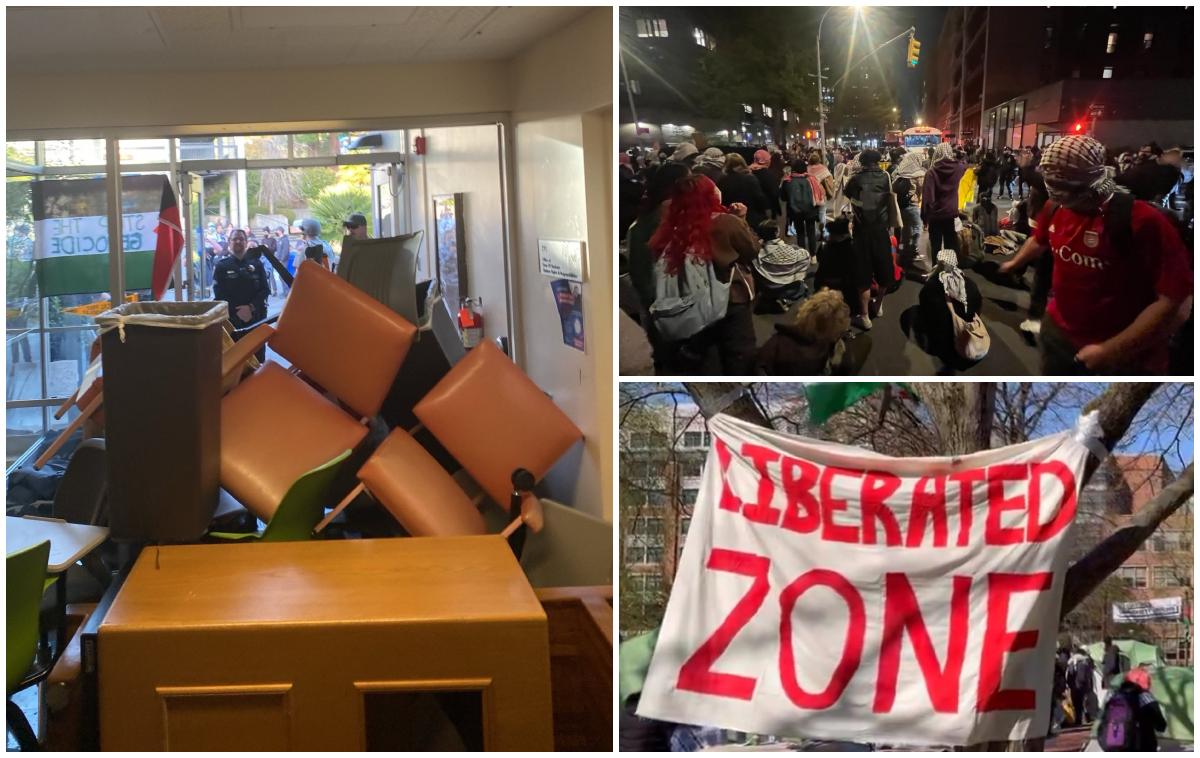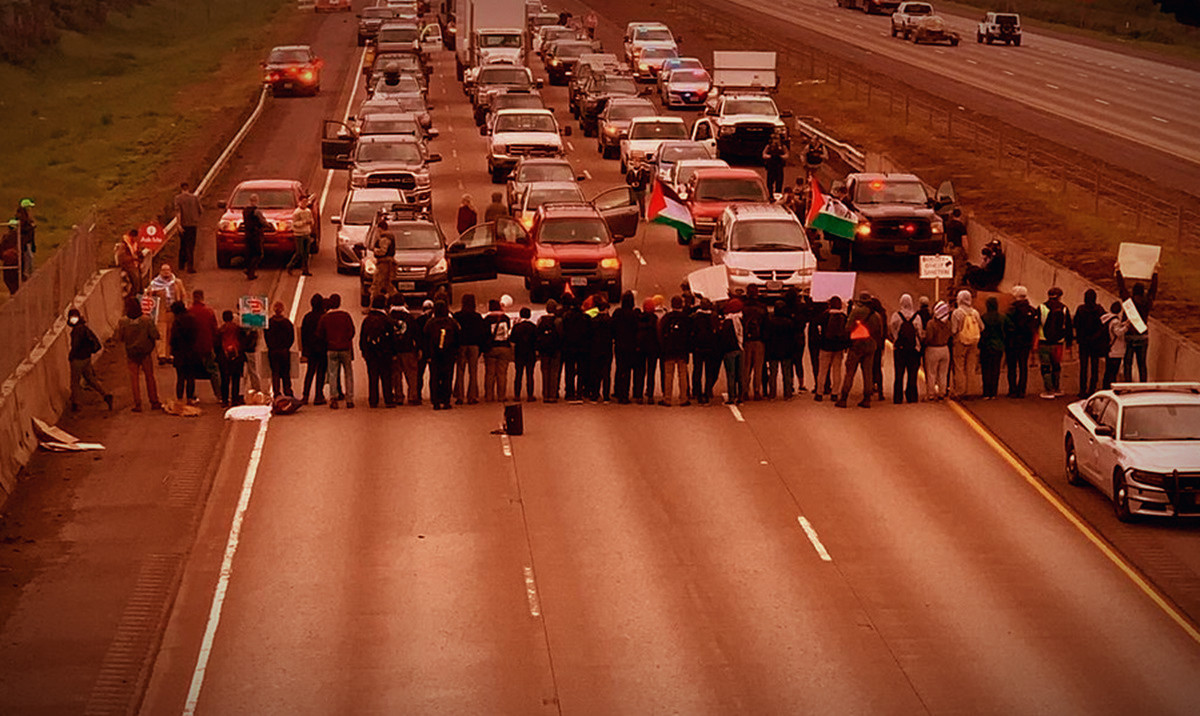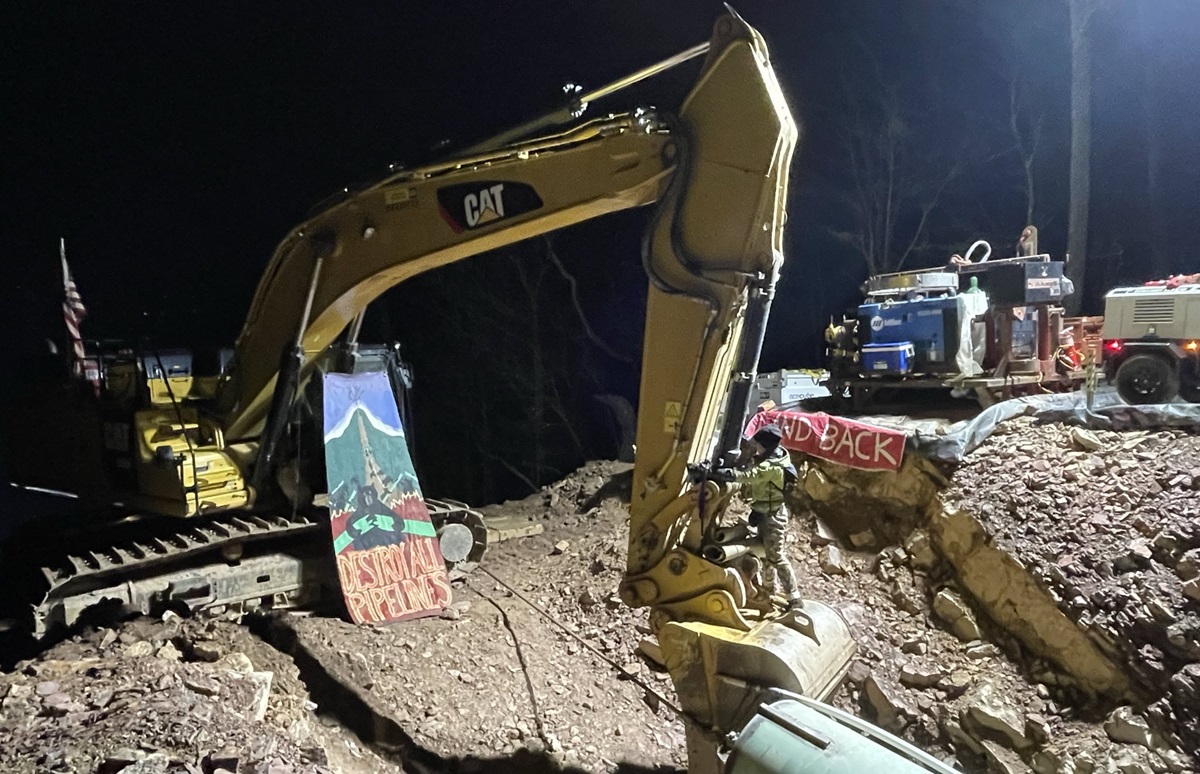Filed under: Canadian Tire Fire, Featured
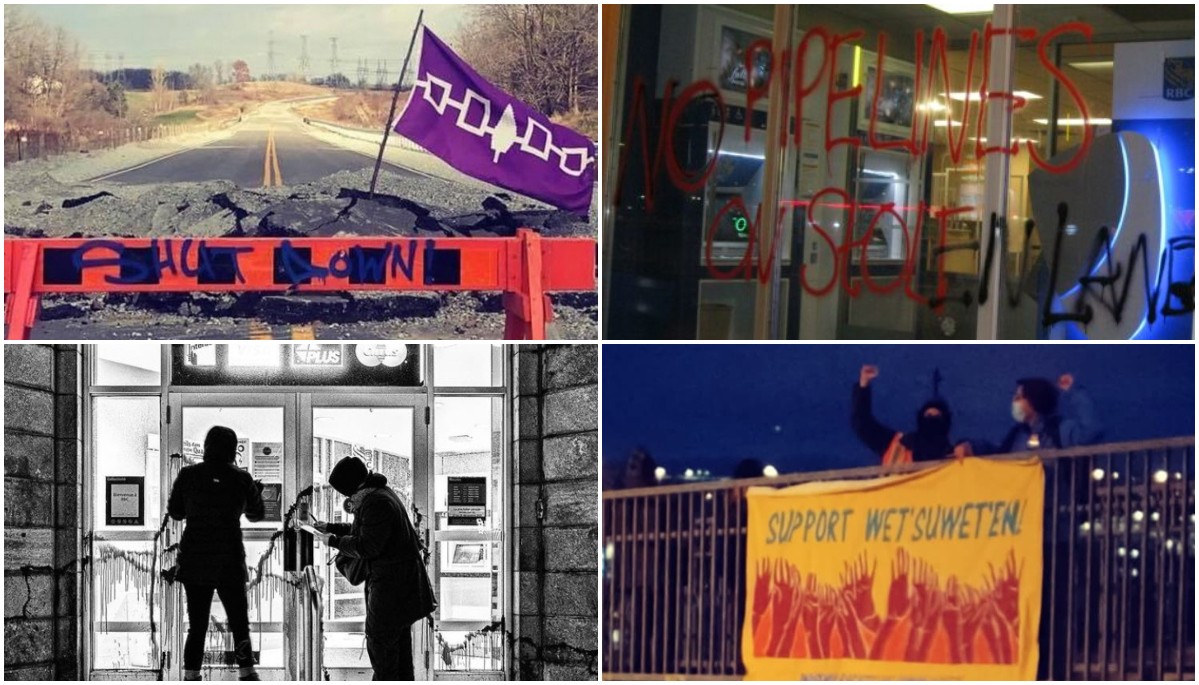
This week we’re covering two weeks worth of struggle news.
On December 21st, 1492 Land Back Lane got another small win when the Ontario Court of Appeal struck down the permanent injunction against them and ordered the failed developer pay spokesperson Skyler Williams $20,000 to cover the costs of the appeal. Though a temporary injunction remains in place (and continues to be defied), the judge recognized that the previous ruling which threw out Skyler’s pleadings was unfair.
BREAKING: the Court of Appeal for Ontario allowed the appeal of @landbackskyler, set aside the Order of Justice Harper in which Skyler’s pleadings were struck out and ordered a permanent injunction, and granted Skyler his costs of $20,000.00 on the Appealhttps://t.co/KqgqoCGbYl
— #1492LandBackLane (@1492LBL) December 21, 2021
We’ve also been keeping an eye on the ongoing struggle of the Kanien’kehá:ka Kahnistensera (Mohawk Mothers) who have been fighting for recognition as the traditional caretakers of the land on which the Royal Victoria Hospital sits in Montreal. In a demonstration earlier this month, Mohawk Mothers and their supporters demanded the keys to the Royal Vic and were met with heavy police aggression.
This week we cover some inspiring updates from the Wet’suwet’en struggle against CGL and share some updates about COVID spread in prisons, and the housing crisis in cities across so-called Canada.
This will be the last CTF of 2021, so thanks for reading and see you in 2022!
Wet’suwet’en Update: Coyote Camp Retaken, Solidarity Actions Continue
One month after the brutal raid of Gidimt’en Checkpoint and Coyote Camp in Wet’suwet’en territory in November, land defenders retook Coyote Camp on December 19th. According to Gidimt’en Checkpoint, a group of land defenders evicted Coastal Gaslink employees from CGL’s drillpad, the site of infrastructure burned and bulldozed during the raid, and re-established control of the site.
BREAKING – Gidimt'en Clan Evicts CGL from Drill Site; Re-Occupies Coyote Camp
(THREAD) pic.twitter.com/imsGrPO5qv
— Gidimt’en Checkpoint (@Gidimten) December 19, 2021
As camp infrastructure is built up and land defenders hunker down in frigid temperatures, once again preventing drilling under Wedzin Kwa, a renewed call for supporters to join them on the ground has been made. For ways to support, see yintahaccess.com.
On December 24th, charges were dropped against two journalists who were arrested in the November raid. While anyone’s charges getting dropped is good news, we’re once again seeing the Indigenous land defenders who suffered particularly brutal arrests and continue to be banned from the territory, as well as all the other arrestees, being left behind while this is celebrated as a win for freedom of the press. Let’s keep fighting until all charges are dropped and CGL and the RCMP get the hell off the Yintah.
In the lead up to and following the incredible re-occupation of Coyote Camp, solidarity actions against investors, colonial infrastructure, and more have continued across so-called Canada and beyond.
In Nelson on December 20th, a solidarity demonstration marched from the local MLA office to the RCMP office. In Toronto, protesters shut down the Bloor Viaduct on December 19th. On December 21st, a rally was held at RBC headquarters in the financial district.
Toronto activists today in solidarity with @Gidimten land defenders & #WetsuwetenStrong called on all funders of the #CoastalGasLink pipeline to divest. @RBC is the largest bankroller of fossil fuels in Canada. #divestcgl pic.twitter.com/sb5km4HwCj
— Martin Reis (@BikeLaneDiary) December 22, 2021
Rallies were also held at RBC offices in London, ON, Winnipeg, and Vancouver.
TODAY People take the streets again in downtown #Winnipeg Treaty 1!
We’re calling on @RBC to stop funding climate destruction and violence. Coast to coast and around the world, we know it’s time to #DefundCoastalGasLink. We're with you, #WetsuwetenStrong! @gidimten @likhtsamisyu pic.twitter.com/1ar5XI1FLZ
— Manitoba Energy Justice Coalition (@mbenergyjustice) December 21, 2021
This week, @Gidimten land defenders are calling on allies to stand in solidarity with #WetsuwetenStrong calling on all funders of the #CoastalGasLink pipeline to divest.@RBC is the largest bankroller of fossil fuels in Canada, funding Indigenous rights violations. #DivestCGL pic.twitter.com/0rWsqhcOnY
— Nayeli Jimenez (@nayelijs) December 21, 2021
Also in Vancouver, a series of banners were dropped over rush hour traffic.
NO TMX & CGL PIPELINES! It's getting dark early but we can still find ways to speak up for Indigenous Rights and Climate Justice. Solidarity with Wet'suwet'en and Indigenous land defenders everywhere!#StopTMX #alloutforwedzinkwa #IndigenousRights #climatejustice pic.twitter.com/6Jx8ZGOBtv
— Climate Convergence (@climate604) December 16, 2021
Banner drops occurred in many other cities in recent days and weeks, including in Chicago, Portland, and Burnaby.
#DefundCGL banner was thrown over the Chicago River last night after visiting 5 banks funding the CoastalGasLink pipeline – with @AgainstLine3 @Gidimten pic.twitter.com/2G0JxCWKNM
— Rising Tide Chicago (@RisingTideChi) December 24, 2021
We stand with @gidimten. It’s time to #DefundCoastalGasLink. @RBC, @Chase, @kkr_co fund climate chaos + the destruction of Wet’suwet’en land. #DefundCGL #WetsuwetenStrong #RespectWetsuwetenSovereignty pic.twitter.com/astG2GPVmt
— Portland Rising Tide (@pdxrisingtide) December 23, 2021
What better way to celebrate the holidays with family than by making and dropping a banner with your loved ones?
From so-called BC: "We put up this #AllOutForWedzinKwa banner on Dec 23rd in Burnaby, BC to celebrate the re-occupation of Coyote Camp." pic.twitter.com/hMusYy0TQr
— submedia (@submedia) December 23, 2021
In Montreal, the front of an RBC office was redecorated with a fire extinguisher filled with paint. From the communique:
We went out last night to do a fire extinguisher paint job on the facade of the RBC branch located at the corner of Mont-Royal and Papineau in so-called “Montreal”. In the context of the call by the Gidimt’en clan for an international week of action to defund Coastal GasLink, we acted in solidarity with the Wet’suwet’en who continue to defend their Yintah and who recently re-established Coyote Camp. Our solidarity will not be interrupted by the new lockdown in progress here.
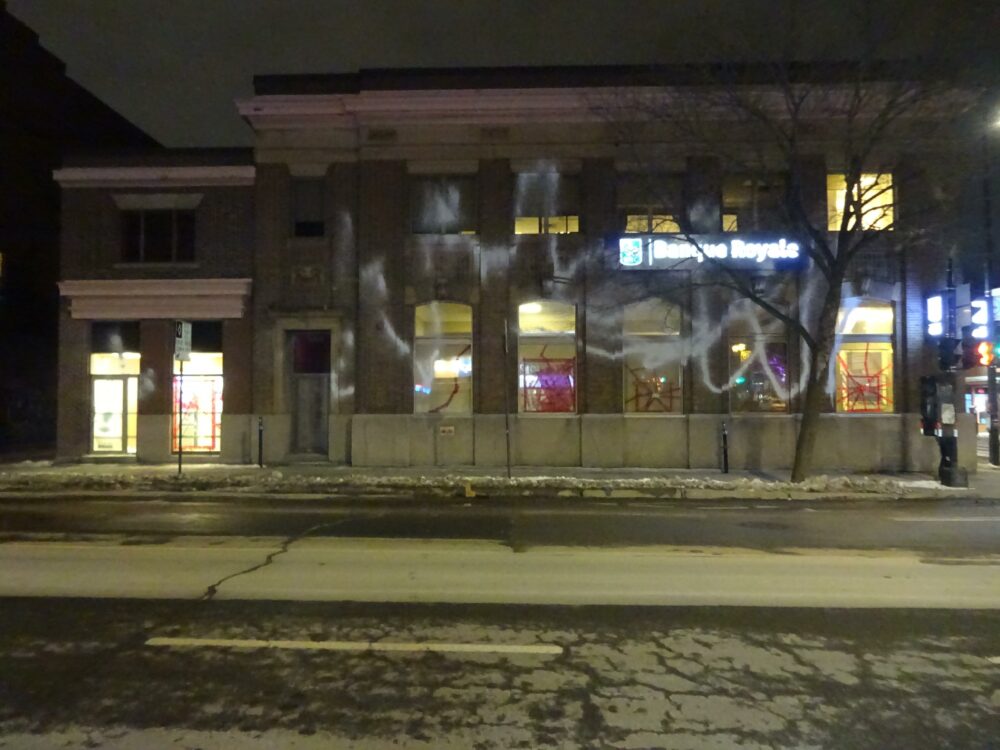
Resistance at RBC Bank. Source: MTL Counter-Info
In Hamilton, some anarchists celebrated Christmas night by filling three RBC ATM card slots with glue, gluing the lock of the door into the bank, and spraypainting “NO PIPELINES ON STOLEN LAND” on the windows. From the communique:
We entered the first doors of the bank and filled their three ATM card slots with glue. We then additionally superglued the lock on the door into the bank. On the way out we left a message “NO PIPELINES ON STOLEN LAND” on the doors for all to see. This was a very easy and replicable action that we encourage others to take up. It is possible that the continued attack against banks like RBC will begin to eat into their pipeline profits (if we can cost them enough money) and convince them to withdraw financial support for the project. And, if not, it’s a real cathartic “fuck you” against the institutions destroying everything good in this world.
As we head into this liminal space between Christmas and New Years, some of the darkest days of the year, we are reminded to take stock of what still matters to us and what we hope to bring into our lives in the coming trip around the sun. As we head into what might be another COVID winter, we encourage all our comrades to look into the warmest parts of their hearts where we all still want prisons and banks to burn and for our friends to hold our hands and dance around the flames. For as long as we keep those sparks alive in our eyes, everything is still possible.
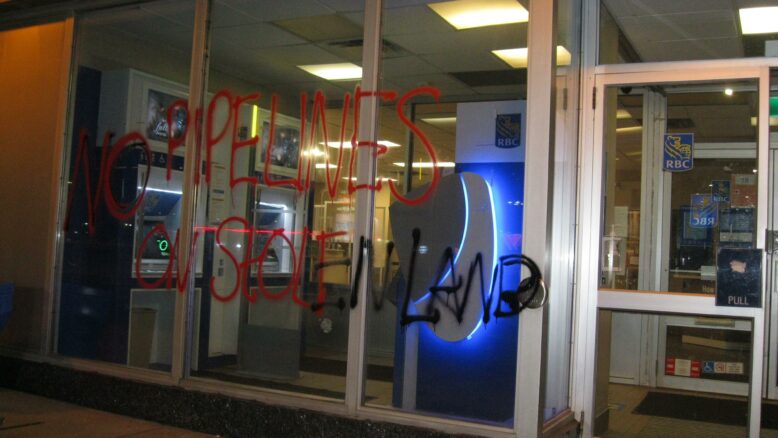
Source: North Shore-Counter-Info
In Rimouski, QC, an RBC office was also vandalized with paint and posters.

Source: Instagram
In Joliette and Repentigny, QC, on December 18th, demonstrators distributed flyers at RBC locations. Internationally, a demonstration was held in Australia during the Annual General Meeting of the National Australia Bank, an investor in CGL.
While Wet’suwet’en Hereditary Chiefs called into the @NAB AGM to demand they divest from #CoastalGasLink on unceded land, we joined that call across NAB offices across the country.#DivestCGL #WetsuwetenStrong pic.twitter.com/ZYOjTTPfep
— 350Australia (@350Australia) December 17, 2021
In Chicago, protesters occupied the lobby of the city’s only RBC office to demand they disinvest from the project.
#Chicago activists storm into Royal Bank of Canada’s only Chicago location to demand they defund Coastal Gas Link’s criminal #pipeline on #Wetsuweten territory! #wetsuwetenstrong #etsuwetensolidarity #chicagoprotest #Canada pic.twitter.com/ETsgCeaAG3
— ChicagoAgainstLine3 (@AgainstLine3) December 24, 2021
We look forward to seeing more solidarity actions in the new year. All our love goes to the land defenders spending the holidays on the Yintah!
Prisons Hit Hard by Omicron
As COVID-19 case numbers continue to rise, the risk for those locked up increases exponentially.
Already this month, outbreaks have been declared at the Warkworth federal prison, the Brockville Jail, the Niagara Detention Centre, Ottawa-Carleton Detention Centre, Toronto East Detention Centre (all in Ontario), and the Bordeaux prison in Quebec. In response to the outbreak at the Brockville jail, officials shut down the facility entirely, sending all prisoners to the Central East Correctional Centre in Lindsay. All new admissions to the Brockville jail are temporarily being sent to the Ottawa-Carleton Detention Centre (OCDC).
This comes amidst calls to depopulate OCDC, as prisoners there are already reporting severe overcrowding. Based on prisoner calls to the Jail Accountability & Information Line, run by the Criminalization and Punishment Education Project (CPEP) in Ottawa, prisoners have reported 24-hour lockdowns and triple-bunking of cells. CPEP has responded with calls for depopulation of OCDC and community supports for those formerly incarcerated. In a recent column, members of the project pointed out that in the first wave of the pandemic, the Ontario prison population was cut by more than 30%, greatly reducing the risk of outbreaks. However, prison populations have again been allowed to climb, and much more action is needed to prevent the spread of the highly-transmissable Omicron variant.
1/4 Please share this urgent message!
People imprisoned at the Ottawa-Carleton Detention Centre are facing severe crowding, the constant threat of #COVID19 outbreaks and related segregation-like conditions of confinement. pic.twitter.com/YUdcnZ9Sqn
— CPEP Group (@CPEPgroup) December 14, 2021
In other Ontario prison news, a vigil was held in Toronto on December 18 to mark the 5-year anniversary of the death of Soleiman Faqiri, who who was beaten to death while in mental health crisis by guards in the Central East Correctional Centre. Five years later, his family and loved ones are still fighting for accountability from the province, jail administration, and the guards involved. They are also calling for change in the prison system’s response to people facing mental health issues.
It's been five years since Soleiman Faqiri was beaten to death by prison guards at Central East. Still no one has been held accountable. Soli should be with us today and his death is a reminder that prisons do not keep us safe.#JusticeForSoli #FreeThemAll #ContainCOVIDNotPeople pic.twitter.com/C2Tbn5dJSG
— Toronto Prisoners' Rights Project (@letstalkjails) December 19, 2021
Housing Crisis and State Control Take Their Toll in Halifax and Toronto
People in Halifax gathered outside the Mi’kmaw Native Friendship Center, on Dec 17, to protest the closure of a shelter run by the centre. The shelter said it will be closing its doors at the end of the month. Workers at the shelter believe the closure is to prevent them from forming a union. The shelter housed 40 people that will now be moved to hotel rooms, which will be paid for with the money that will no longer be spent on shelter operating costs, the provincial government has said.
As this housing crisis worsens in Halifax, the City seems to be working with catholic archdioceses of Halifax and a local company to build temporary shelters that are similar to the ones constructed by Halifax Mutual Aid. The HMA shelters were destroyed by the City back in August.
Remember when Halifax destroyed crisis shelters with a chainsaw and said it was ok because everyone was offered a place to live https://t.co/gnLCo7zNBZ
— Adam Boyd (@BoydMath) December 23, 2021
In Toronto, it was announced 34 homeless people died over the last month, 17 died in October, 14 in September and 19 in August. So far, it is estimated that 49% of the deaths in 2021 are from drug toxicity. Readers might remember that in July the city of Toronto engaged in a few brutal encampment clearings, uprooting and disrupting the lives of many of the city’s homeless residents. It is only speculation as to what lives would have been saved by allowing the Toronto encampments to remain. There is evidence to say that encampments do reduce drug related deaths, unlike government or NGO run shelters. Both of these situations are just another reminder of the disgusting consequences and lengths the State will go to to exercise its control over people’s lives and prevent us from helping each other and ourselves.


